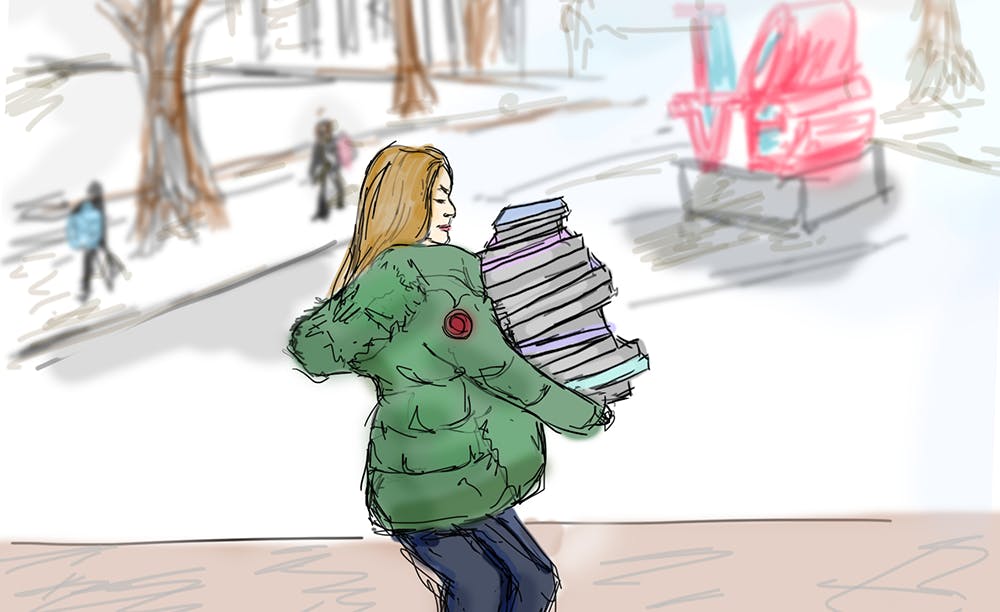
On Sept. 7, Provost Wendell Pritchett and Vice Provost for Education Beth Winkelstein sent out an email to all undergraduates, outlining the new extension for the pass/fail deadline and new limit on the number of courses a students can take in a semester. This semester, the pass/fail deadline is now Oct. 26, and students can take up to 7.5 c.u.s, with a hard limit of 5.5 c.u.s for advance registration.
Similar to the decision to curtail Huntsman Hall’s hours, Penn is clearly trying to tangibly show that they are listening to students’ concerns over mental health at Penn. By working closely with student groups such as Penn Wellness and Student Committee on Undergraduate Education, the administration has begun to roll out new changes that have received mixed reviews from students, but nevertheless have actually affected Penn’s academic environment.
While I understand the concerns students may have about finishing credits or wanting to take more classes than deemed necessary, I believe this change is ultimately a beneficial one, and comes at a good time when student wellness seems to have hit all-time lows. With many students trying to get dual degrees, triple minor, or simply take as many classes as they can, there is a culture of academic stress that certainly adds to the overall mental unwellness on campus.
Indeed, on other campuses across the country, it’s quite rare to take more than four classes per semester. When I talk to my friends that go to different universities, they are surprised to hear that the average Penn student typically takes more than 4 c.u.s. After being a student here for more than two years, I do not think it’s uncommon at all to take 5 or even 6 classes in one semester, which might be inherently unhealthy thinking. Why is it that we feel the need to overload ourselves academically, and think this is normal?
Many students have pushed back, claiming that academic pressure may not necessarily be the cause of unhappiness. Just like the Huntsman backlash, students claim Penn’s administration is not addressing the true issues behind mental health by closing a building early. While this may be true, it’s undeniable that Penn students are simply overcommitted and stressed — and small factors, such as overloading on courses and the pressure to stay up late to cram, all add to the toxicity of Penn’s environment. By making these small, incremental changes such as imposing course limits and limiting a building’s hours, we can slowly turn around the deep-rooted problems of our campus.
A year ago, I think I would have been just as outraged by this new initiative as other students are. During the fall of my sophomore year, I had an existential crisis and ended up taking six classes in one semester, frantically exploring different subjects and trying to do more than I could simply because I felt pressured to get the most out of my Penn education. With many of my peers trying to graduate with dual degrees, it seemed like a normal thing to do.
Long story short, I crashed and burned — taking six classes was simply too much work, and I found myself drowning in the middle of the semester despite my confidence at the start. I realized that to truly get the most out of my education and learn from my classes, I needed to calm down and re-evaluate if I really needed to take this many courses. Ultimately, I realized that classes are about quality over quantity, and if I wanted to take advantage of my education, I needed to truly focus on prioritized classes and plan out my next few years.
At Penn, we are often peer-pressured to do the most, in terms of extracurriculars, social life, and academics. While the new course limit will not fix Penn’s overarching mental health problems, this new initiative, and others rolled out this year, could push students in the direction of healthier habits and better priorities. So this semester, take a good hard look at your schedule — and see if you really need to take that sixth, seventh, or eighth course.

JESSICA LI is a College junior from Livingston, N.J., studying English and Psychology. Her email address is jesli@sas.upenn.edu.
The Daily Pennsylvanian is an independent, student-run newspaper. Please consider making a donation to support the coverage that shapes the University. Your generosity ensures a future of strong journalism at Penn.
Donate






